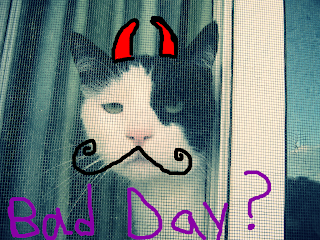Bipolar came into my life like a tornado. It ripped things apart and left me with some devastation for a while. I struggled with coping with bipolar. I struggled with finding a balance in my moods. I struggled with life.
Normal was gone. For a long time I hated myself and this illness. For a long time, I lived only in the illness. Bipolar ruled my life. I thought about it every moment of every day. I was trying so hard to understand it and cope with it, that it took over everything. It ruled me and it defined me.After time and medication, it was no longer at the forefront. I began to think about things I enjoyed doing, kind of like in an afterthought, like "oh yeah, I used to love to sew" and "why haven't I done this in so long?" It was like I was waking up after a long sleep. I began to slowly get back into life, to slowly get back to doing things that I enjoyed.
In many ways, doing these things has made me well.
Sewing, decorating, cooking, gardening, photography, hiking, snowshoeing: all of these things are a part of a set of tools I use to keep myself well. I pull them out and use them on those days when depression feels like it is about to pull me down into the depths. I also use them when I am going up into mania, but with restrictions and limits. So that I am not up sewing and sewing for days and days. How can simple hobbies help someone be well?
If you are doing things that you like to do, you are tapping into strengths and resources that you already have, or skills that you are honing. You are focused on the positive, and on possibilities.
You are also experiencing joy and contentment. You might also boost your self worth by seeing what you have accomplished.
You are in the present moment. If you are completely engrossed in doing something, you get out of your head space. It is nice to leave all of those thoughts for a while.
Now, I am by no means saying that if you have a mental illness, that all you need to do is to 'get to crafting' and that everything will be bright and shiny and you will be just fine.
There are many things that build a life of wellness and get you back to your 'new normal'. But they do play a role. At least, they have for me. I found myself again by doing the things that I love, and by using my strengths. I feel like a normal person again when I am out hiking and looking for things to photograph.
I also see beauty in the world and in myself when I do the things that I enjoy.
I use these things as lifelines against depression. I get up and out of bed, and force myself out the door to go and do anything, but usually it is something that brings me a lot of joy. Like going swimming, or working on a project with my daughter.
For me, my hobbies are a part of my coping skills and they are my wellness tools. When I am out there doing something enjoyable and am focused on my strengths and abilities, bipolar takes it's proper place. It is something that I live with and deal with, but it is not my life. I pay attention to it, or it can get out of hand. But I don't give it all of my time. I don't allow it to steal all of my moments.
This for me, is my new normal. This in many ways, has saved my life.
And now a message from our life coach cats:
The moments of your life belong to you.
What are you going to spend them doing?

































.jpg)